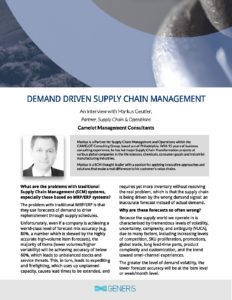Traditional MRP/ERP systems use forecasts of demand to drive replenishment through supply schedules.
Unfortunately, even if a company is achieving a world-class level of forecast mix accuracy (e.g. 80%, a number which is skewed by the highly accurate high-volume item forecasts), the majority of items (with lower volumes and higher variability) will be achieving accuracy of below 60%, which leads to unbalanced stocks and service threats. This, in turn, leads to expediting and firefighting, which uses up unplanned capacity, causes lead times to be extended and requires yet more inventory without resolving the real problem, which is that the supply chain is being driven by the wrong demand signal: an inaccurate forecast instead of actual demand.
Learn all about Demand Driven Supply Chain Management in this interview with Markus Geutler, Partner, Supply Chain & Operations, at Camelot Management Consultants.
Questions answered:
- What are the problems with traditional Supply Chain Management (SCM) systems, especially those based on MRP/ERP systems?
- Why are these forecasts so often wrong?
- If Demand Driven SCM isn’t trying to supply what’s predicted to sell, how does it work and why is it so much better than traditional MRP?
- How does DDMRP deal with major events such as tenders, TV campaigns, plant shut-downs, seasonality, or new product launches?
- How does DDMRP fit with the S&OP/IBP?
- Aside from improving supply chain performance, how does DDMRP impact the supply chain – it’s organization, roles and responsibilities, and key performance indicators?
